Hotel Management App: Guide to the Best Hotel Apps
Sep 29, 2025
 Mika Takahashi
Mika TakahashiPopular Categories
Hotel Technology & InnovationHotel Operations OptimizationDigital MarketingIndustry TrendsRevenue ManagementHospitality Industry
Popular Categories
Trending Post
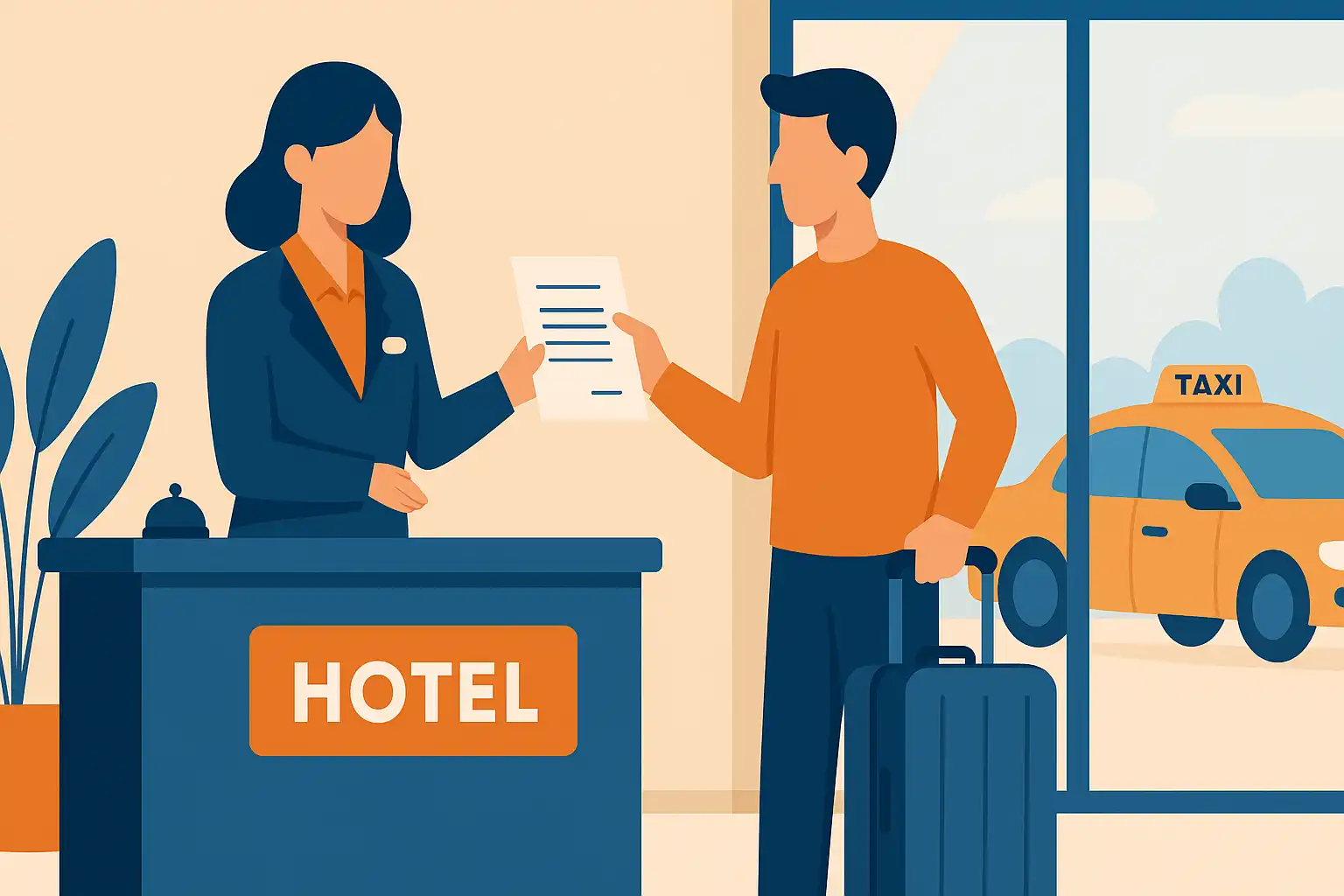
Hotel Walk Letter Template: Professional Guest Communication
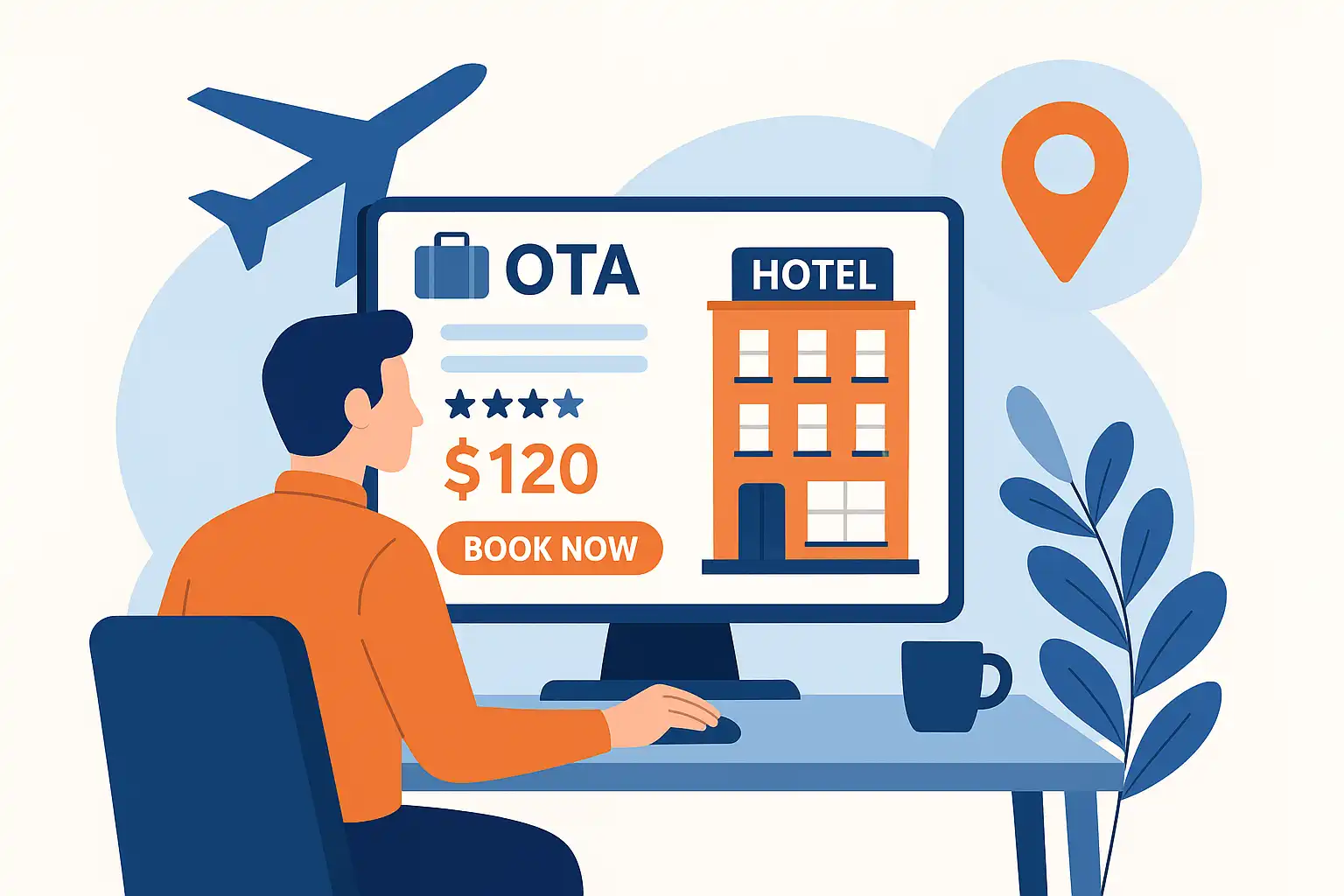
Online Travel Agents: What They Are and How They Work
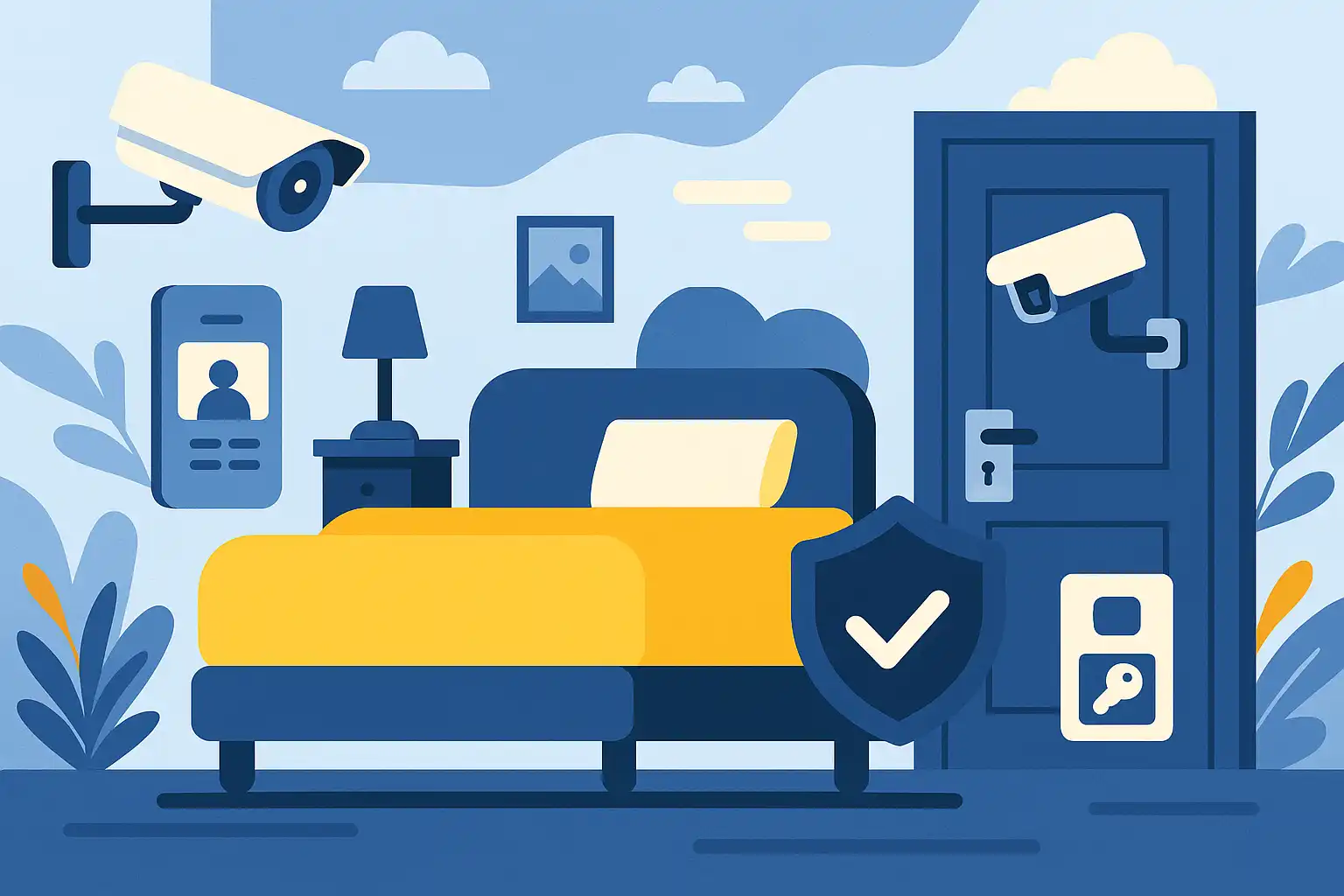
Hotel Security Systems: Modern Protection Solutions

Hotel Advertising: Complete Guide to Boost Bookings and Revenue
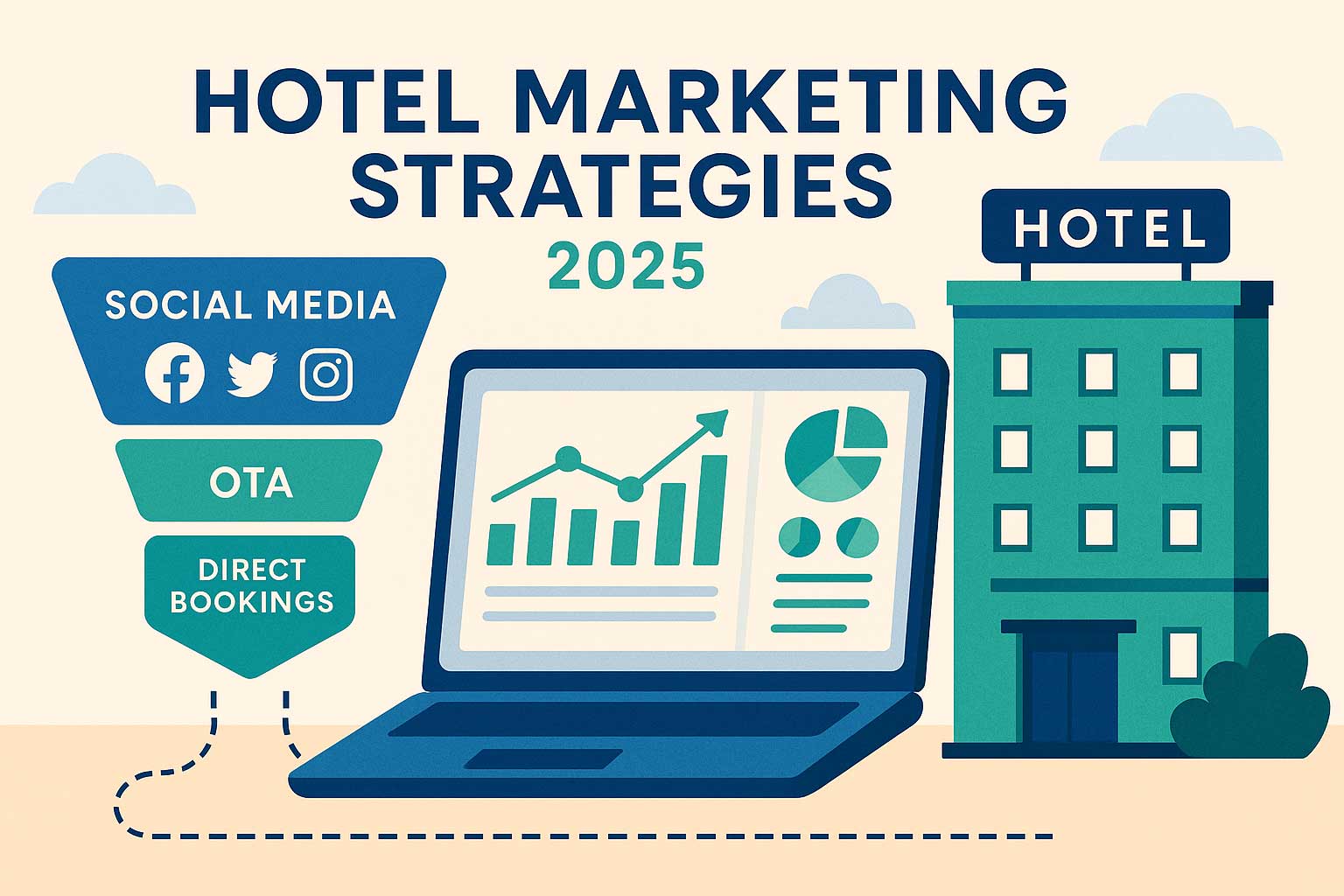
25 Hotel Marketing Strategy Ideas for 2025: Complete Guide

AI Reservation Agent: Revolutionizing Hotel Booking and Guest Experience

PMS Communication: Streamlining Property Management Through Effective Guest Messaging
Table of contents
The hospitality industry has seen a massive digital makeover over the last decade. Today, about 65% of hotels with 50 or more rooms have adopted cloud-native hotel management software. It’s clear that modern technology isn’t just a nice-to-have anymore—it’s a must-have if you want to stay ahead in this competitive market.
A hotel management app acts as the digital backbone of today’s hospitality operations. It streamlines everything from booking reservations and managing the front desk to handling guest services and optimizing revenue. These all-in-one solutions have transformed hotel operations, replacing clunky manual processes prone to mistakes with smooth, integrated systems that boost both efficiency and guest satisfaction.
In this complete guide, we’ll walk you through the key features of hotel management apps, take a closer look at Prostay’s innovative all-in-one solution, and explore how its integration with the Tableview point of sale system creates a seamless experience for hospitality businesses.
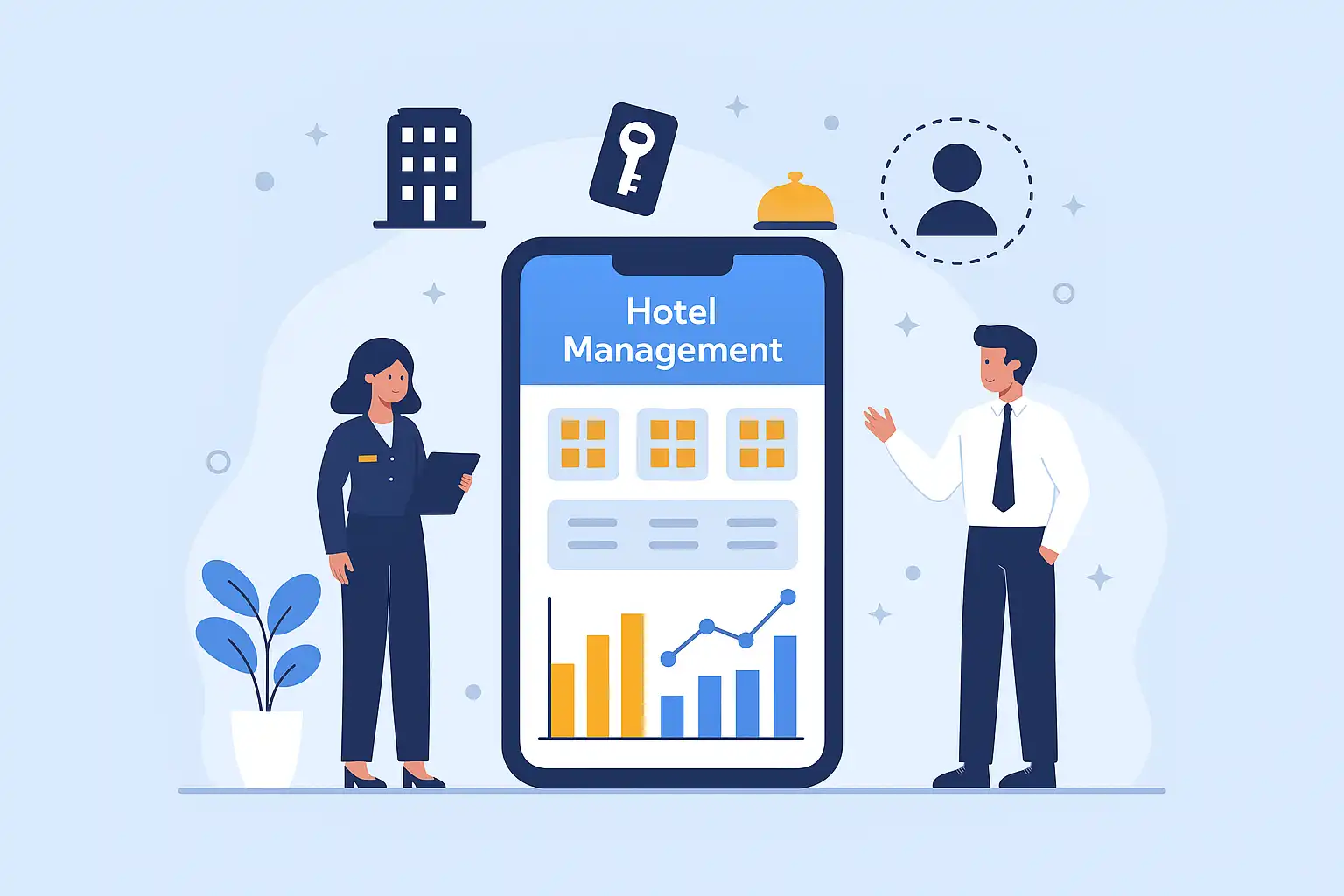
What Is a Hotel Management App?
Think of a hotel management app as your hotel’s command center—a digital tool that automates and centralizes your daily operations through an easy-to-use interface. These property management systems handle everything from reservations and housekeeping coordination to payment processing and guest data analysis.
Today’s hotel management software is way more than just a booking system. These apps for hotel management bring multiple aspects of hotel operations together into one platform, helping your team deliver outstanding guest experiences while maximizing both revenue and efficiency. The move from manual tasks to cloud-based automation is all about real-time data syncing, fewer mistakes, and better communication with guests.
A hotel management application usually acts as the central hub connecting all your hotel’s departments. When a guest books a room through your booking engine, the app updates room availability across all channels, triggers housekeeping schedules, and prepares guest info for the front desk. This means every team member works with the same, up-to-date information.
Thanks to smooth integration with booking engines, payment systems, and third-party platforms, these hotel management apps have become essential for properties of all sizes. Whether you run a boutique hotel or a large chain, these comprehensive solutions help you compete in a digital world without sacrificing service quality.
Core Features of Modern Hotel Management Applications
Reservation Management and Channel Distribution
At the heart of any hotel management app is reservation management. Modern apps handle bookings across multiple platforms at once, making sure your room availability and pricing stay consistent whether guests book on your website, through online travel agencies, or via direct booking engines. This helps prevent double bookings and keeps your inventory accurate.
Channel managers built into these apps automatically push your rates and availability to platforms like Booking.com and Expedia. When a guest books on any channel, your system updates inventory everywhere in real time—a must-have for smart revenue management.
Front Desk Operations and Guest Management
The front desk is where the daily magic happens. Hotel management apps simplify check-in and check-out, assign rooms automatically based on guest preferences and availability, and give staff instant access to guest details and special requests. They keep a full record of guest history, preferences, and past services to help your team deliver personalized experiences.
Many apps for hotel management include mobile versions, so your front desk staff can manage operations from anywhere on the property. Whether it’s mobile check-in, updating guest requests, or coordinating with housekeeping, your team stays efficient without being glued to a desktop.
Housekeeping Management and Real-Time Updates
Keeping rooms clean and ready is key to happy guests and high occupancy. Modern hotel management apps offer real-time updates on room status, automatically scheduling cleaning based on checkouts and arrivals. Housekeeping can update room status instantly via mobile devices, so the front desk always knows which rooms are ready.
The system also tracks maintenance requests and special cleaning needs, helping your team keep service quality consistent. When integrated with front desk operations, guest services can provide accurate info about room readiness and handle special requests smoothly.
Guest Communication and Personalized Service
Today’s travelers expect smooth, ongoing communication during their stay. Hotel management apps come with tools that automate messages before arrival, coordinate services while guests are on-site, and follow up after check-out. They can even send personalized recommendations based on guest preferences and past visits.
Guests can use mobile apps to request services, order room service, or chat with staff directly, making their experience more connected and enjoyable. This also helps lighten the front desk’s workload.
Revenue Management and Dynamic Pricing
Smart revenue management features help hotels boost profits through dynamic pricing. These apps analyze past data, current demand, and market trends to suggest the best rates across all channels. Thanks to channel management integration, price changes update everywhere instantly.
Revenue management systems often include automated upselling during booking and check-in, helping hotels increase revenue per guest with relevant upgrade offers that also enhance the guest experience.
Comprehensive Reporting and Analytics
Making smart decisions means having the right data. Hotel management apps provide detailed reports on occupancy, average daily rate (ADR), revenue per available room (RevPAR), and guest demographics. These insights help hotel managers spot trends, optimize operations, and craft effective marketing strategies.
Customizable dashboards let different team members focus on the metrics that matter most to their roles—from housekeeping efficiency to financial performance.
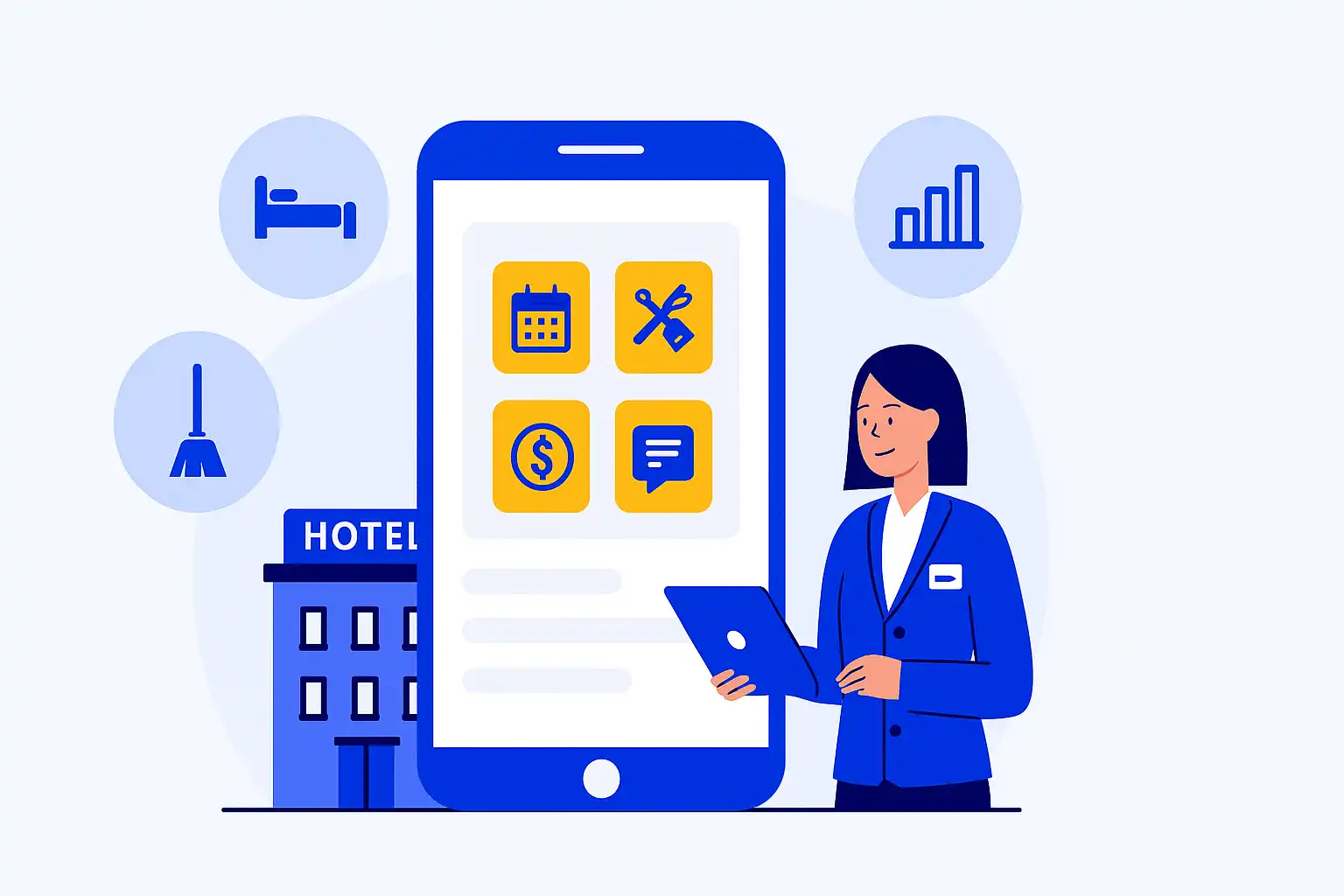
Prostay: An All-in-One Cloud and On-Premise Hotel Management Solution
Prostay shines in the hotel management software category by offering both cloud-based and on-premise options. This flexibility makes it perfect for independent hotels, boutique properties, luxury hotels, and hotel groups with different needs around data security and accessibility.
Benefits of Cloud-Based Architecture
Prostay’s cloud version offers excellent accessibility, letting hotel managers and staff log in from anywhere with internet access. This is especially handy for managing multiple properties, where general managers need oversight across locations. The cloud setup also means automatic updates, strong security, and easy scalability as your hotel business grows.
Cloud deployment cuts down on IT infrastructure costs and provides reliable backups, so you can rest easy knowing your property management system is always up to date and secure.
On-Premise Deployment for Greater Control
If your hotel has strict data security or compliance needs, Prostay’s on-premise option lets you keep full control over your data and system customization. This is often preferred by hotel chains with existing IT setups and luxury hotels that prioritize data sovereignty.
You get all the cloud features but with direct control over storage, backups, and customization.
Integrated Modules for Seamless Operations
Prostay’s all-in-one solution brings together reservations, guest management, and front desk operations in one platform. Its booking engine connects directly to your website, enabling direct bookings that automatically update inventory across all channels.
The channel manager keeps your room availability and pricing in sync across online travel agencies and your direct booking engine, preventing overbookings and pricing mismatches.
Real-Time Synchronization Across Departments
One of Prostay’s standout features is real-time data syncing. Whether cloud or on-premise, all departments work with the same current info. When housekeeping updates room status, the front desk sees it immediately. When a new reservation comes in, housekeeping schedules adjust automatically.
This synchronization extends to billing, where charges from restaurants, bars, and other services flow directly into guest folios, cutting down billing errors and manual work.
Customization for Different Hotel Types
Prostay understands that boutique hotels and large chains have very different needs. It offers customization options so you can tailor workflows, reports, and interfaces to fit your property’s unique operations.
Independent hotels can focus on optimizing direct bookings and personalizing guest service, while hotel groups benefit from multi-property management and standardized reporting. The system scales smoothly from small guest houses to large luxury hotels.
Integration with Tableview Point of Sale System
Prostay’s integration with Tableview, a point of sale system, takes hospitality apps to the next level. This two-way connection creates a seamless operational ecosystem, breaking down data silos between hotel operations and food & beverage services.
Seamless Guest Folio Integration
All guest charges from restaurants, bars, spas, and other hotel amenities sync instantly to guest folios. When a guest orders room service via Tableview’s POS, the charges appear in Prostay’s guest management module right away—cutting manual data entry and billing errors by over 90%.
This means the front desk can always provide guests with accurate, up-to-date billing information, creating a smooth and satisfying guest experience.
Real-Time Inventory Management
The integration also keeps your inventory accurate. When restaurant staff process orders, Prostay updates inventory across the hotel automatically. This gives hotel managers full visibility into food and beverage usage, helping reduce waste and make smarter purchasing decisions.
This real-time inventory tracking is a big help for hotels with multiple dining outlets and room service.
Unified Payment Processing
Guests can charge all services to their room no matter where they dine or what amenities they use. The integration supports multiple payment methods and automatically handles currency conversion for international travelers.
Prostay Pay, a fully integrated credit card solution, lets you process payments securely within the hotel management app itself, cutting down on the need for separate terminals and speeding up transactions.
This unified payment approach makes life easier for guests and gives hotels valuable spending data to improve marketing and loyalty programs.
Powerful Cross-Platform Reporting
Combining hotel operations data with food and beverage performance, the integration offers robust reporting. Hotel managers can analyze guest spending habits, spot cross-selling opportunities, and optimize revenue strategies based on comprehensive data.
These insights help hotels engage guests more effectively with personalized offers and targeted promotions, boosting direct bookings and encouraging repeat visits.
Boosting Operational Efficiency
By eliminating manual data entry between hotel and restaurant systems, the integration cuts reconciliation times by up to 70%. Staff can focus more on guest service and less on paperwork, while managers trust their financial reports.
During busy times, this seamless connection helps hotels handle hundreds of food and beverage transactions without billing errors, all while keeping an eye on occupancy and restaurant performance.
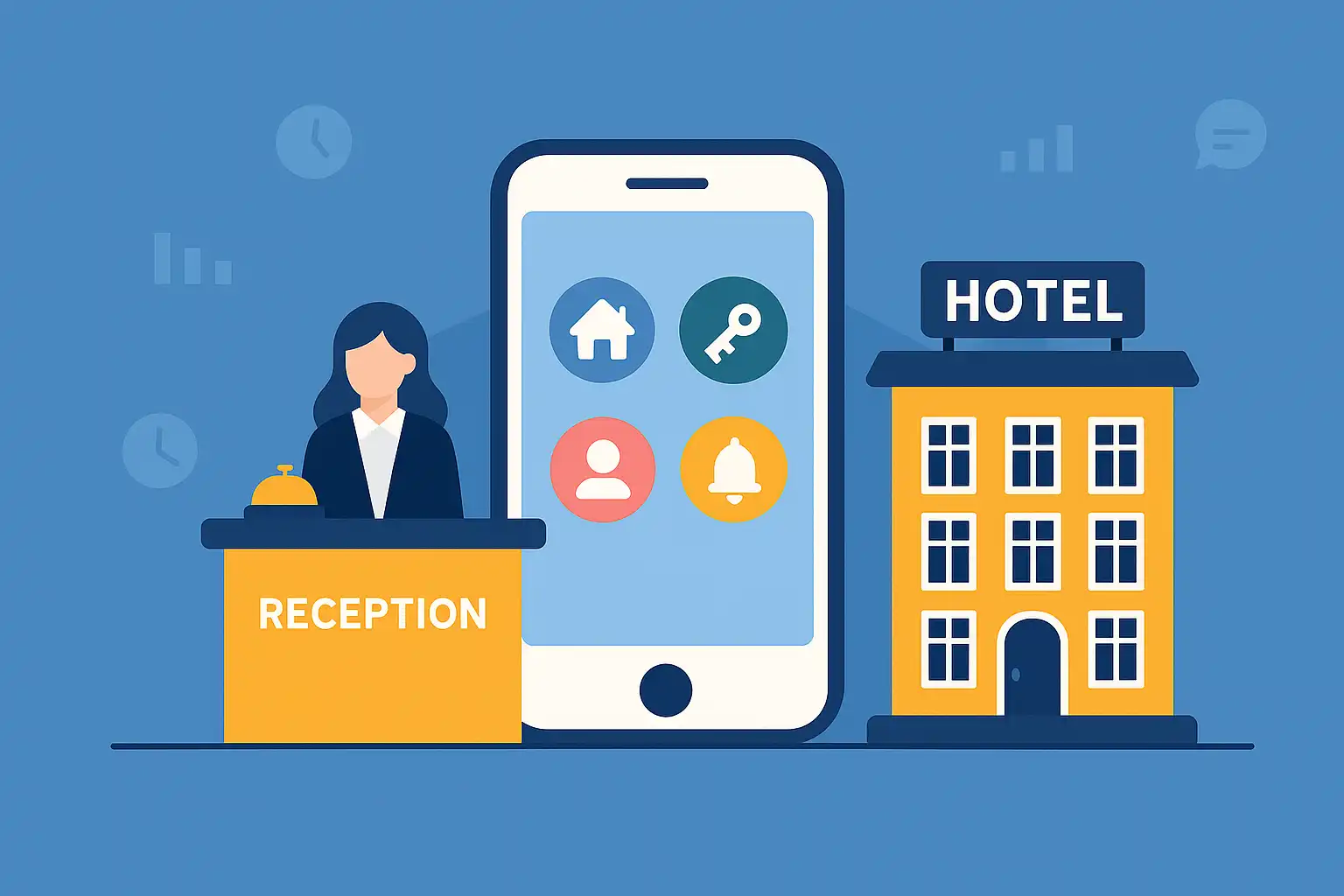
Benefits of Using Hotel Management Apps
Streamlining Operations Through Automation
Hotel management apps automate many repetitive tasks that used to take up valuable time. What once took 7-10 minutes at check-in can now be done in under 2 minutes with mobile check-in and automated room assignments.
Automation also speeds up night audits, end-of-day reports, and housekeeping schedules, freeing your team to focus on what really matters: your guests.
Hotels using integrated hotel management apps report up to 70% improvements in back-office efficiency, with less manual work and fewer errors.
Improving Guest Satisfaction and Experience
Faster service, personalized communication, and smooth coordination all add up to happier guests. Hotel management apps let you tailor experiences based on guest preferences from past visits, encouraging repeat stays and positive reviews.
Mobile apps let guests request services and access info without waiting in line or making calls, making their stay more convenient and enjoyable.
Hotels that invest in guest management apps see higher satisfaction scores and more loyal customers.
Driving Revenue Growth
Built-in revenue management tools help hotels optimize pricing, upsell services, and analyze guest data to boost profits. Targeted marketing campaigns based on guest behavior reduce reliance on online travel agencies and increase direct bookings.
Automated upselling during booking and check-in suggests upgrades that enhance guest stays while increasing revenue.
Reducing Errors and Increasing Accuracy
Automating processes cuts down on human errors in bookings, billing, and coordination. Inventory sync prevents overbookings, and integrated billing eliminates discrepancies between departments.
Hotels report fewer billing disputes and smoother operations with hotel management apps, thanks to real-time data sharing.
Accurate financial reporting supports better business decisions and planning.
Making Data-Driven Decisions
Hotel management apps provide detailed analytics on occupancy, revenue per available room, guest demographics, and more. These insights help managers spot trends, improve operations, and plan marketing strategies.
Advanced reporting highlights guest preferences, seasonal demand, and operational bottlenecks, enabling proactive management.
Combining operational and financial data gives a full picture of hotel performance.
Enhancing Guest Experience with Technology
Mobile and Contactless Solutions
Mobile check-in and check-out are no longer optional—they’re expected. These features reduce wait times and let guests skip the front desk altogether. Digital keys complement this by letting guests unlock rooms with their phones.
Contactless tech has become essential, especially in today’s world, and hotels offering these options see higher guest satisfaction and more direct bookings.
In-App Service Requests
Guests can request housekeeping, order room service, or communicate with staff directly through hotel apps. This cuts down on phone calls and speeds up response times.
Staff get detailed requests and can update guests as services are completed, improving efficiency and satisfaction.
Personalized Experiences Based on Guest Data
Hotel management apps analyze guest history and preferences to tailor recommendations—from room choices to dining and local attractions.
This proactive personalization makes guests feel valued and encourages them to return.
Multi-Language and Accessibility Features
International travelers appreciate apps that support multiple languages and accessible design. This ensures all guests can use hotel services easily, no matter their language or abilities.
Such inclusivity broadens your potential guest base and demonstrates your commitment to exceptional service.
Revenue Management and Analytics
Real-Time Tracking and Dynamic Pricing
Hotel management apps provide real-time data on bookings and occupancy, helping managers adjust prices instantly based on demand and market conditions.
This agility helps maximize revenue during busy times and maintain occupancy during slower periods.
Automated Revenue Optimization
Apps suggest upsells and price adjustments automatically, analyzing guest profiles and inventory to recommend relevant upgrades and services.
Hotels using these features often see higher average daily rates and increased revenue per guest.
Comprehensive Analytics and Forecasting
Analyzing guest spending helps hotels create targeted marketing and develop new services. Benchmarking against industry standards shows competitive positioning and improvement areas.
Forecasting tools predict demand and help plan staffing and resources effectively.
| Metric | Traditional Management | With Hotel Management App | Improvement |
|---|---|---|---|
| Check-in Time | 7-10 minutes | Under 2 minutes | 70-80% reduction |
| Billing Errors | 5-10% of transactions | Less than 1% | 90%+ reduction |
| Revenue Per Room | Baseline | 15-25% increase | Significant improvement |
| Staff Efficiency | Standard productivity | 60-70% improvement | Major gains |
Marketing Strategy Integration
Linking guest data with marketing tools lets hotels run targeted campaigns that boost direct bookings and reduce OTA dependency. Personalized emails based on guest history get better engagement than generic promos.
Tracking campaign success through the hotel management app helps refine marketing strategies over time.
Choosing the Right Hotel Management App for Your Property
Assess Your Property’s Needs
Start by understanding your hotel’s unique challenges and goals. Independent hotels often focus on direct booking optimization and personalized guest service, while chains need multi-property management and standardized reporting.
Property size matters too—boutique hotels need different features than large resorts with many outlets. Identify pain points like manual booking, billing errors, or housekeeping inefficiencies.
Budget for not just licensing but also implementation, training, and support. A more comprehensive app might cost more upfront but pays off with efficiency gains.
Consider Your Technology Setup
Decide between cloud and on-premise based on your internet reliability, security needs, and IT support. Cloud apps offer easy access and updates, great for smaller hotels and groups.
On-premise suits luxury hotels or chains with strict compliance or existing IT infrastructure, though it requires more investment and support.
Check compatibility with your current software—accounting, marketing, loyalty programs—and ensure the app integrates well.
Plan for Growth
Choose an app that can grow with you. Whether adding rooms or new locations, your system should scale without needing a complete overhaul.
Look for modular systems where you can add features like revenue management or analytics as needed.
Make sure it handles peak seasons smoothly and allows flexible user access.
Integration and Compatibility
Your hotel relies on many tech platforms. The right hotel management app should integrate seamlessly with booking engines, payment processors, marketing tools, and feedback systems.
POS integration, like Prostay’s with Tableview, is crucial if you have dining or other amenities.
Check the vendor’s track record for integrations and API support to future-proof your investment.
Training and Support
Successful adoption depends on good training and support. Assess your team’s tech skills and the complexity of the system.
Look for vendors offering thorough training, clear documentation, and responsive customer service. Local support can be a big plus.
Consider total cost of ownership, including training and ongoing support.
Best Practices for Implementation
Plan Ahead
Start with detailed planning—data migration, training, and keeping operations running smoothly. Set a timeline for setup, data transfer, training, and phased rollout.
Clean and organize your data beforehand to avoid issues.
Assign project managers and system champions to guide the process.
Roll Out in Phases
Don’t launch everything at once. Begin with core features like reservations and front desk, then add housekeeping, revenue management, and analytics.
This helps staff get comfortable gradually and keeps operations stable.
Consider running old and new systems side-by-side during the transition.
Train Your Staff Thoroughly
Create role-specific training tailored to each team’s daily tasks.
Hands-on practice beats lectures—set up test environments for safe learning.
Keep training ongoing for updates and new features.
Test Everything
Before going live, test all integrations and workflows under different scenarios—busy periods, outages, unusual cases.
Make sure guest-facing features work smoothly from booking to check-in.
Plan for Support and Maintenance
Set up clear processes for maintenance, user management, and troubleshooting.
Train key staff to handle routine fixes to reduce vendor dependency.
Schedule maintenance during slow times to minimize disruption.
Build strong vendor relationships for quick issue resolution.
Plan for regular updates and change management to keep your system current.
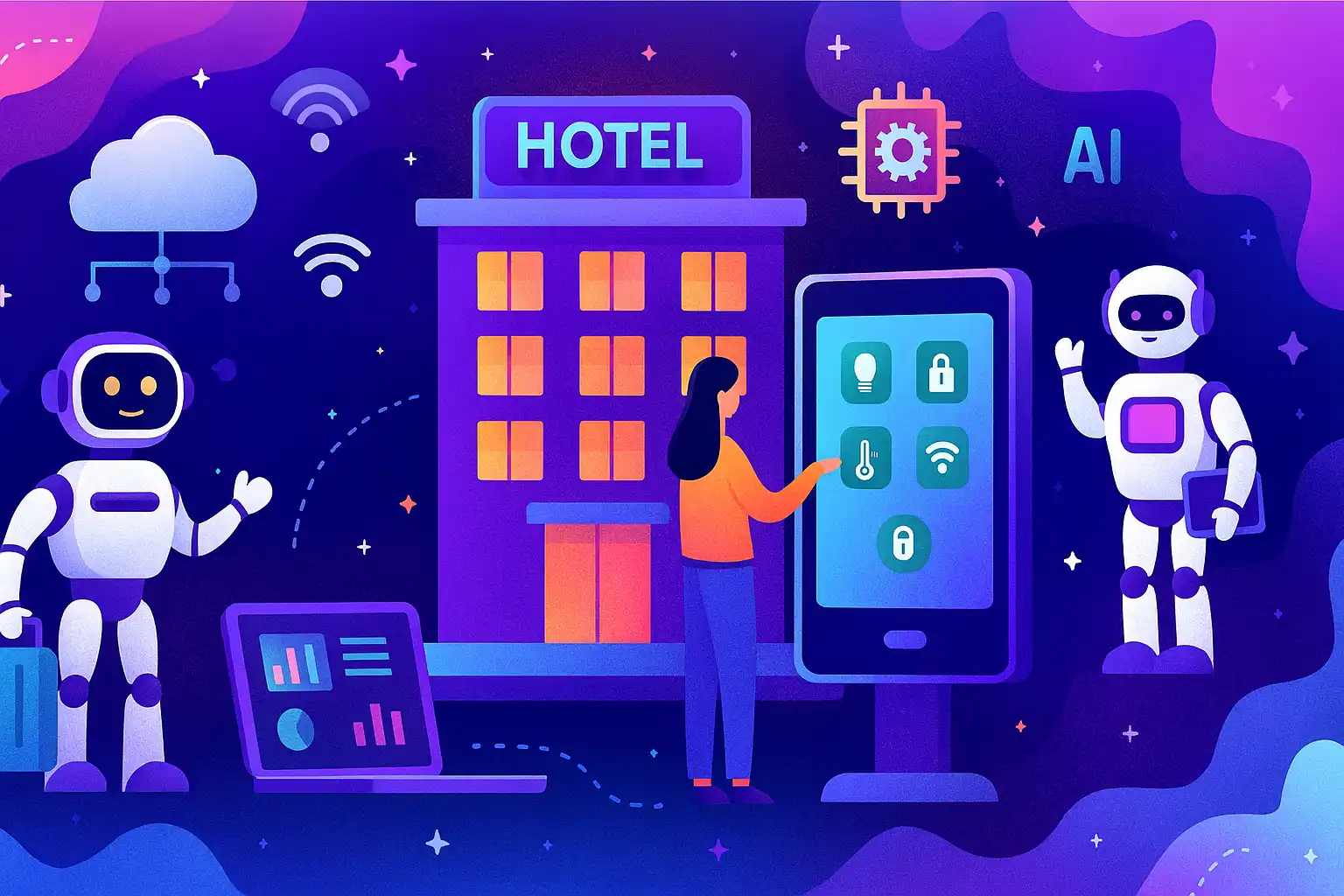
Future Trends in Hotel Management Technology
Artificial Intelligence and Predictive Analytics
AI is shaping the future of hotel management apps. These systems analyze guest behaviors, booking trends, and operational data to offer predictive insights that help you make proactive decisions and improve guest experiences.
Machine learning can forecast maintenance needs, optimize staffing, and suggest personalized services based on guest history.
Dynamic pricing powered by AI adjusts rates in real time, factoring in competitors, events, weather, and demand to maximize revenue.
AI chatbots and virtual assistants provide 24/7 guest support, freeing staff for more complex tasks and improving response accuracy over time.
Internet of Things (IoT) Integration
Smart rooms with hotel IoT sensors monitor occupancy, temperature, and energy use, adjusting settings automatically to boost comfort and cut costs.
Connected devices track everything from elevator use to kitchen equipment, enabling predictive maintenance and better resource allocation.
Energy management systems reduce utility bills while keeping guests comfortable.
IoT also enhances security with advanced access controls and automated monitoring.
Voice-Activated Guest Services
Voice assistants in rooms let guests control settings, order services, and get local info with simple commands.
Voice tech extends to lobbies and common areas, offering self-service options that many guests prefer.
Integration with hotel management apps ensures voice requests are properly tracked and fulfilled.
Privacy and opt-in controls are essential to balance convenience with guest trust.
Blockchain and Enhanced Security
Blockchain helps secure guest identity verification and loyalty programs, providing tamper-proof records and safe info sharing.
Digital IDs speed up check-in while protecting personal data.
Blockchain also supports cross-brand loyalty programs and secure digital payments, including cryptocurrency options.
Augmented Reality and Marketing
AR lets potential guests take virtual tours of your property before booking—a big plus for boutique and luxury hotels.
Guests can use AR to get info about local attractions and restaurants by pointing their phones at landmarks.
AR marketing delivers personalized promotions based on guest location and preferences.
Training staff with AR offers immersive, hands-on learning experiences.
The future of hotel management apps is bright, blending cutting-edge technology with personal service to create exceptional guest experiences and operational success. Hotels embracing these tools while keeping the human touch will stand out in a competitive market.
If you’re considering investing in hotel technology, think about how these trends fit your brand and guests. The best solutions will seamlessly integrate innovation with warm, personalized hospitality.
By choosing comprehensive hotel management apps like Prostay, you’ll be ready to meet today’s challenges and tomorrow’s opportunities with confidence.
The perfect balance of technology and personal service is the key to thriving in the evolving world of hospitality.
